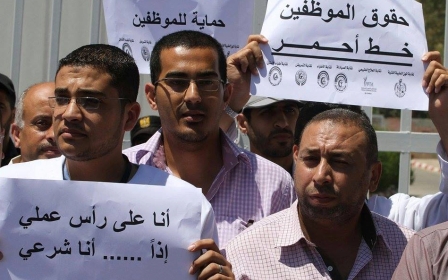PA says failure to pay Gaza civil servants salaries due to 'technical' issue

The Fatah-led Palestinian Authority has paid salaries to its West Bank employees this month but not those in Gaza, officials said on Monday, amid an ongoing split with the Strip's Islamist ruling party, Hamas.
While the reasons behind the failure to pay salaries was not immediately clear, the PA Finance Ministry said in a statement on Tuesday that the delay was due to unspecified "technical" issues unrelated to political disputes.
"We hope that they will be overcome soon," the statement said, without providing further details.
Gaza civil servants were left in the dark for days as to the reason why the salaries had not been paid, prompting fears at a time when relations between the West Bank-based PA and Hamas are at rock bottom.
"Salaries were paid into banks in the West Bank and not in Gaza," Arif Abu Jarad, head of the union representing PA employees in the Gaza Strip, had told AFP on Monday.
"There is a state of anger among staff in the Strip," he added, saying they were having emergency meetings against this "terrible crime".
The uproar from civil servants likely prompted the PA to issue its statement on Tuesday.
The PA has kept paying its tens of thousands of employees in Gaza despite most not going to work since Hamas seized control of the territory in 2007 after the party won legislative elections a year earlier, following which internal tensions nearly brought about a civil war.
Meanwhile, the estimated 50,000 people who continue to work in public sector jobs in Gaza have only received sporadic payments, putting them in precarious financial situations.
This is not the first time that Gaza civil servants’ salaries have been in apparent jeopardy. In 2017, the PA imposed a 30 percent pay cut on employees in Gaza, causing civil servants to take to the streets in protest, and forcing 6,000 into early retirement.
The PA had argued at the time that its decisions were caused by Hamas collecting government revenues in Gaza without sending them back to the Ramallah-based authority, whereas Hamas has accused the PA of deliberately applying further economic pressure on the impoverished coastal territory, which has been under an Israeli-imposed blockade for nearly 11 years.
Analysts say cutting the salaries would seek to increase discontent in the Gaza Strip, putting more pressure on Hamas.
Hugh Lovatt, Israel and Palestine fellow with the European Council of Foreign Relations think-tank, said the halt to payments, if confirmed, would represent Abbas "doubling down" on threats.
"This comes against the backdrop of increasing attempts by Abbas to impose sanctions on Hamas and Gazans," he told AFP.
"I see this as one more step."
Multiple reconciliation attempts between the two factions have failed, most recently an Egyptian-brokered deal signed in October, during which Hamas had initially pledged to close down its parallel administration in Gaza in exchange for the creation of a unity government.
Last month, PA president Mahmoud Abbas accused Hamas of planning a failed assassination attempt on his prime minister, Rami Hamdallah, who was on a rare visit to Gaza. Hamas has denied being involved in the attack.
Protests since along the Gaza border that have been targeted by Israeli forces, killing 31 Palestinians since 30 March, have nonetheless led to expressions of support for Gazans from Abbas.
New MEE newsletter: Jerusalem Dispatch
Sign up to get the latest insights and analysis on Israel-Palestine, alongside Turkey Unpacked and other MEE newsletters
Middle East Eye delivers independent and unrivalled coverage and analysis of the Middle East, North Africa and beyond. To learn more about republishing this content and the associated fees, please fill out this form. More about MEE can be found here.




